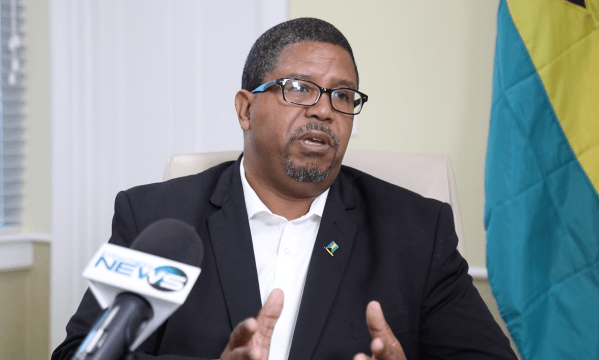NASSAU, BAHAMAS – Deputy Prime Minister and Minister of Finance K Peter Turnquest yesterday flagged the importance of strengthening the national framework for disaster response as a key lesson learned from Hurricane Dorian.
Turnquest delivered the keynote address at the opening of the Sustainable Grand Bahama conference at the University of the Bahamas’s northern campus.
“One of the most important lessons we learned was the importance of strengthening our national framework for response, recovery and reconstruction,” he said.
“The historic scope of Dorian’s destruction required us to acknowledge that we need new state structures to serve more effectively. We established the new Ministry of Disaster Preparedness, Management and Reconstruction to streamline the how we prepare, recover and rebuild in the event of a disaster.
“We are updating our laws, policies, procedures and state agencies to support this strengthening of the national disaster management mechanism. An Act of Parliament created the Bahamas Disaster Reconstruction Authority for the management of reconstruction and restoration in disaster zones.”
He continued: “While the Authority is focused on reconstruction, under the new framework, the National Emergency Management Agency (NEMA) will remain focused on preparation for, mitigation against potential future disasters, and the immediate response, relief and recovery when disasters strike.”
Turnquest further noted that while it is expected that NEMA and the Authority will collaborate on some activities, the focus of the Authority will be specifically on reconstruction, addressing challenges related to infrastructure, the economy, health, education, the environment and housing.
“Previously, there was no structure in government to lead and manage these types of activities in a dedicated way specific to disaster reconstruction,” he said.
“Projects would get lost among the wide-ranging priorities of government ministries that had inter-ministerial carriage over different aspects of reconstruction. Under this new framework, reconstruction is streamlined under the Authority, which is to lead the way with the Small Home Repair Assistance Programme.”
According to Turnquest, more than 200 Bahamians made online submissions to the Small Home Repair Program on its launch day in Grand Bahama.
That program allows qualifying Bahamian homeowners to use purchase orders to obtain building materials and other items related to home restoration.
He further noted that the insurance industry is also “a ripe area for lessons learned”.
“Flexible insurance policies that allow for tailored coverage are essential for meeting country-specific needs in the region,” Turnquest said.
“The Bahamas had the benefit of a $12.8M payout from the Caribbean Catastrophe Risk Insurance Facility (CCRIF). I am proud to say the Minnis-Administration pioneered the restructuring of this policy, which allowed us to actually receive a benefit in our time of need.
“Although catastrophic risk insurance is an important component for our national disaster risk management framework, insuring with the CCRIF had unfortunately become politically charged. Not everyone was convinced the insurance scheme was meeting our needs as an archipelagic nation.
He said: “The Government successfully renegotiated a better deal to tailor the policy by separating the archipelago into three geographic zones with unique parametric triggers for each region. We recognized that flexible insurance that allows for tailored coverage is essential to our multi-layered approach to disaster risk management and for meeting our country-specific disaster needs.”
“However, on the private side sector, we are finding that too many Bahamians are taking on unmanageable and unsustainable risk by not taking out insurance coverage on their homes and businesses or, are underinsured.
Turnquest said: “In the aftermath of a major hurricane, the damage and loss to the private sector is significantly larger than the damage and loss incurred by the Government. This was the case with Hurricane Dorian where estimated damage alone was $2.5 billion, of which 91 percent was private.
“Losses were estimated at $717.3 million and were also sustained primarily in the private sector, which accounted for 84 percent of the total. Some insurance experts estimate that anywhere from 40 percent to 50 percent of the persons in the affected areas after Dorian were uninsured, and some 75 percent were underinsured.”






